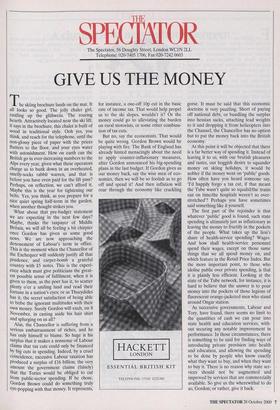SPECTA'T'OR
The Spectator, 56 Doughty Street, London WC1N 2LL Telephone: 020-7405 1706; Fax 020-7242 0603
GIVE US THE MONEY
The skiing brochure lands on the mat. It all looks so good. The jolly chalet girl, rustling up the gliihwein. The roaring hearth. Attractively located near the ski lift, it says in the brochure, this chalet is built of wood in traditional style. Ooh yes, you think, and reach for the telephone, until the non-glossy piece of paper with the prices flutters to the floor, and your eyes water with astonishment. How on earth can the British go in ever-increasing numbers to the Alps every year, given what these operators charge us to bunk down in an overheated, smelly-socks rabbit warren, and that is before you have even paid for the lift pass? Perhaps, on reflection, we can't afford it. Maybe this is the year for tightening our belts. Yes, you think, as you prepare for a nice quiet spring half-term in the garden, when another thought strikes you.
What about that pre-budget statement we are expecting in the next few days? Maybe, thinks the taxpayer of Middle Britain, we will all be feeling a bit chirpier once Gordon has given us some good news. We are now approaching the denouement of Labour's term in office. This is the moment when the Chancellor of the Exchequer will suddenly justify all that prudence, and carpet-bomb a grateful country with f5 notes. This is the experi- ence which must give politicians the great- est possible sense of fulfilment, when it is given to them, as the poet has it, to scatter plenty o'er a smiling land and read their fortune in a nation's eyes; or as Thucydides has it, the secret satisfaction of being able to bribe the ignorant multitudes with their Own money. Surely Gordon will exult, on 8 November, in casting aside his hair shirt and splurging on us all?
Alas, the Chancellor is suffering from a serious embarrassment of riches, and he has only himself to blame. So huge is his surplus that it makes a nonsense of Labour claims that tax cuts could only be financed by big cuts in spending. Indeed, by a cruel coincidence, excessive Labour taxation has produced a surplus of £16 billion, the very amount the government claims (falsely) that the Tories would be obliged to cut from public-sector spending. If he chose, Gordon Brown could do something truly eYe-popping with that money. It represents, for instance, a one-off 10p cut in the basic rate of income tax. That would help propel us to the ski slopes, wouldn't it? Or the money could go to alleviating the burden on rural motorists, or some other combina- tion of tax cuts.
But no, say the economists. That would be quite wrong. Gordon Brown would be playing with fire. The Bank of England has already hinted menacingly about the need to apply counter-inflationary measures, after Gordon announced his big-spending plans in the last budget. If Gordon gives us our money back, say the wise men of eco- nomics, then we will be so foolish as to go off and spend it And then inflation will roar through the economy like crackling gorse. It must be said that this economic doctrine is very puzzling. Short of paying off national debt, or bundling the surplus into hessian sacks, attaching lead weights to it and dropping it from helicopters into the Channel, the Chancellor has no option but to put the money back into the British economy.
At this point it will be objected that there is a far better way of spending it. Instead of leaving it to us, with our brutish pleasures and tastes, our hoggish desire to squander money on skiing holidays, it would be nobler if the money went on 'public' goods. How often have you heard someone say, `I'd happily forgo a tax cut, if that meant the Tube wasn't quite so squalid/the trains ran on time/the hospitals weren't so over- stretched'? Perhaps you have sometimes said something like it yourself.
The first part of the rejoinder is that whatever 'public' good is found, such state spending is ultimately just as inflationary as leaving the money to fructify in the pockets of the people. What takes up the lion's share of health-service spending? Wages. And how shall health-service personnel spend their wages, except on those same things that we all spend money on, and which feature in the Retail Price Index. But the more important point, to those who idolise public over private spending, is that it is plainly less efficient. Looking at the state of the Tube network, for instance, it is hard to believe that the answer is to pour money into the pockets of those legions of fluorescent orange-jacketed men who stand around Ongar station.
As successive governments, Labour and Tory, have found, there seems no limit to the quantities of cash we can pour into state health and education services, with- out securing any notable improvement in performance. In those circumstances, there is something to be said for finding ways of introducing private provision into health and education, and allowing the spending to be done by people who know exactly what they want to buy, and when they want to buy it. There is no reason why state ser- vices should not be augmented and improved by services that are commercially available. So give us the wherewithal to do so, Gordon; or rather, give it back.


























































































 Previous page
Previous page